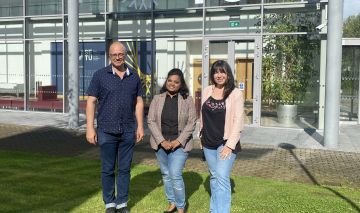Recently, Dr Thomais Kakouli-Duarte from South East Technological University’s (SETU’s) enviroCORE, joined forces with Dr Douglas McMillan, from Green Restoration Ireland (GRI), to support a postdoctoral nematologist, Dr Anusha Pulavarty, in carrying out an ecological assessment of GRI’s peatland restoration efforts.
Dr Pulavarty will study nematodes and their assemblages, as they are representative of their habitat, respond quickly to disturbance or change in the soil/sediment composition, and are excellent for environmental biomonitoring and as indicators of soil health.
One of the objectives of GRI’s Farm Carbon European Innovation Partnership is to baseline and characterise peatland habitats for the physical, chemical, and biological properties of their soils - in order to identify indicators of soil health, and then to determine the effects of rewetting on these soils.
Peat grassland soils are a significant source of greenhouse gases, annually emitting 3-9 million tCO2e as well as significant levels of water pollution. Research will provide supporting evidence to facilitate the transition to wetland agriculture (paludiculture), that is, crop production with higher water levels.
Significant contribution
Dr McMillan says, “Achieving this will make a significant contribution to Ireland's international obligations to address carbon and water pollution and provide options for farm diversification that will generate new income streams for our rural communities.”
Dr Kakouli-Duarte adds, “This exciting project will help us assess nematode biodiversity and their abundance as a means of assessing the ecological status and health of the restored sites, thus filling the current knowledge gap in this important area in relation to the Irish landscape.”
The project is co-funded by the Irish Research Council (IRC) – Enterprise partnership Scheme and GRI.


